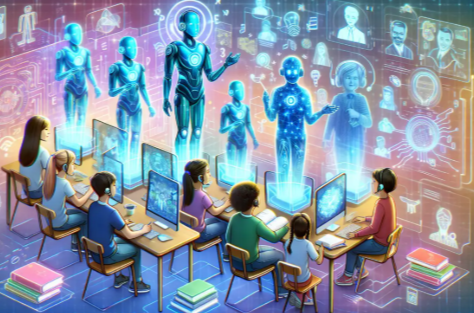The integration of AI tutors is transforming education by offering personalized learning experiences tailored to individual student needs. These systems utilize adaptive learning techniques to engage students more effectively and provide immediate feedback. However, the implementation of AI in educational settings raises important ethical and privacy concerns that must be navigated carefully. As these technologies evolve, their influence on learning environments and educational practices will become increasingly significant, prompting deeper exploration of their broader implications.
The Role of AI Tutors in Personalized Learning
As educational landscapes evolve, the integration of AI tutors has emerged as a transformative force in personalized learning.
These intelligent systems harness adaptive learning techniques to tailor educational experiences, providing individualized feedback that addresses each student’s unique needs.
Advantages of AI Tutors in Enhancing Student Engagement
Numerous advantages arise from the integration of AI tutors in enhancing student engagement.
These intelligent systems provide interactive feedback, allowing learners to receive immediate responses tailored to their needs. Additionally, AI tutors often incorporate gamified learning elements, transforming educational tasks into engaging experiences.
This combination fosters a sense of autonomy and motivation, empowering students to take charge of their learning journey while deepening their understanding.
Read more: The Role of Artificial Intelligence in Predicting Natural Disasters
Challenges and Considerations for Implementing AI in Education
Implementing AI in education presents a myriad of challenges and considerations that educators and institutions must navigate carefully.
Data privacy is a paramount concern, as sensitive student information may be exposed. Ethical concerns also arise regarding bias in AI algorithms and their impact on equitable learning opportunities.
Addressing these issues is essential for fostering an educational environment where technology enhances, rather than undermines, student development.
The Future of AI Tutors and Their Impact on Learning Environments
The emergence of AI tutors signals a transformative shift in learning environments, promising to redefine educational experiences for both students and educators.
Their effectiveness hinges on personalized learning pathways, fostering engagement and understanding.
However, ethical implications must be carefully navigated, including data privacy and reliance on technology.
Balancing innovation with responsibility will shape the future landscape of education and empower learners to thrive.
Conclusion
In the grand tapestry of educational evolution, AI tutors emerge as the delicate thread weaving personalized learning experiences. Their potential to captivate and engage students is a promising dawn, yet the shadows of ethical concerns and data privacy loom nearby. As educators and technologists navigate this intricate landscape, embracing a balanced approach is paramount. Ultimately, the future of AI tutors holds the promise of transforming learning environments, fostering autonomy, and nurturing a deeper understanding of knowledge.
